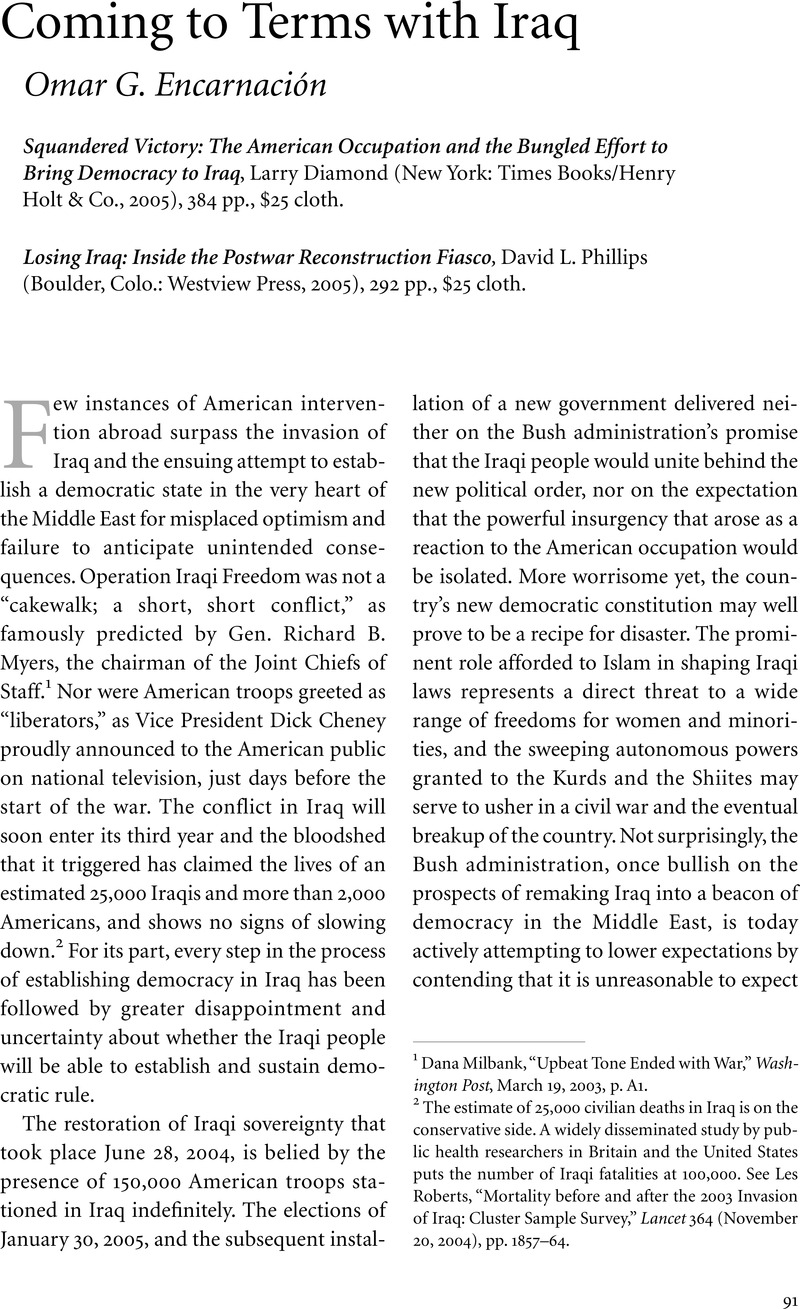Published online by Cambridge University Press: 28 September 2012

1 Dana Milbank, “Upbeat Tone Ended with War,”Washington Post, March 19, 2003, p. A1.
2 The estimate of 25,000 civilian deaths in Iraq is on the conservative side. A widely disseminated study by public health researchers in Britain and the United States puts the number of Iraqi fatalities at 100,000 . See Roberts, Les , “ Mortality before and after the 2003 Invasion of Iraq: Cluster Sample Survey ,” Lancet 364 (November 20, 2004 ), pp. 1857 – 64.CrossRefGoogle ScholarPubMed
3 See Robin Wright and Ellen Knickmeyer, “U.S. Lowers Sights on What Can Be Achieved in Iraq,”Washington Post, August 14, 2005, p. A1; and Peter Grier, “Expectations for Iraq Downshifting,” Christian Science Monitor, August 17, 2005, p. 1.
4 Larry Diamond, Squandered Victory: The American Occupation and the Bungled Effort to Bring Democracy to Iraq (New York: Times Books/Henry Holt & Co., 2005), p. 15.
5 Lawrence F. Kaplan, “Federal Reserve,”New Republic, March 17, 2003, p. 19.
6 David Rieff, “Blueprint for a Mess: How the Bush Administration's Prewar Planners Bungled Postwar Iraq,”New York Times Magazine, November 2, 2003, p. 32.
7 Quoted in Sidney Bell, Righteous Conquest: Woodrow Wilson and the Evolution of the New Diplomacy (Port Washington, N.Y.: Kennikat Press, 1972), p. 79.
8 Peter H. Smith, Talons of the Eagle: Dynamics of U.S.–Latin American Relations (New York: Oxford University Press, 1996), pp. 53–54.
9 Dueck, Colin , “ Hegemony on the Cheap: International Liberalism from Wilson to Bush ,” World Policy Journal 20, no. 4 (2004 ), p. 6.Google Scholar
10 Minxin Pei and Sara Kaspar, “Lessons from the Past: The American Record on Nation Building,” Carnegie Endowment for International Peace, Policy Brief, May 24, 2003; available at http://www.carnegieendowment.org/pdf/files/Policybrief24.pdf. It is difficult to generalize about what made these successful cases of democratization possible. All of them, however, caution about giving too much credit to the Americans. The historiography on postwar Germany and Japan suggests that success was largely due to previous experience with democracy and to high levels of social and economic development prior to World War II. Democratization in Panama and Grenada was undoubtedly helped by these countries' small size.
11 For a broader discussion of the developments of these ideas under Wilson and their recent adoption by the Bush administration to rationalize the imposition of democracy in Iraq, see Encarnación, Omar G. , “ The Follies of Democratic Imperialism ,” World Policy Journal 22, no. 1 (2005 ) pp. 47 – 60.CrossRefGoogle Scholar